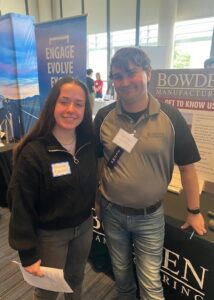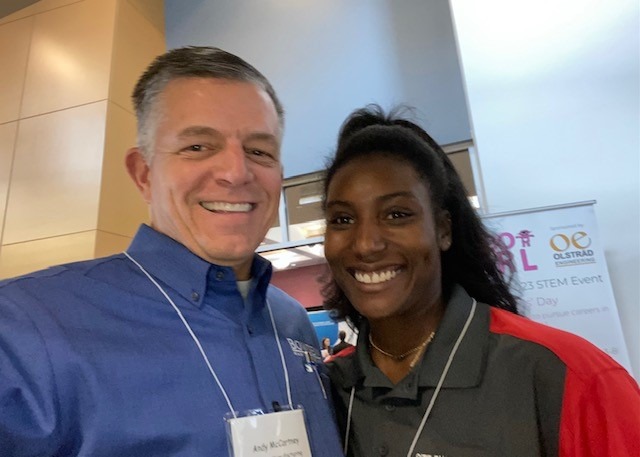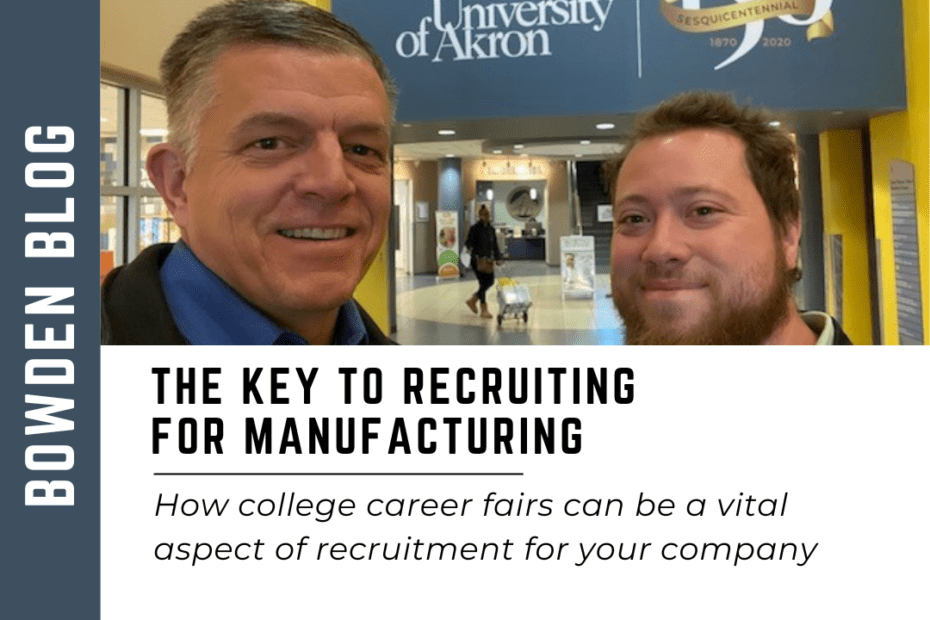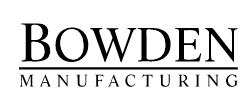The Key to Recruiting for Manufacturing: College Career Fairs!
This week started the full-on return to in-person career fairs among the Northeastern Ohio colleges that we’ve attended in recent years:
- Case Western Reserve University
- The University of Akron
- Cleveland State University
It’s been exciting to be back on campus, without a mask mandate, for the first time since prior to the pandemic. Getting back into career fair mode requires a bit of adjustment, so here are a few keys as you get back out trying to recruit college talent for your Manufacturing organization.
Great to be Back In-Person!
The overwhelming consensus among employers and students is that career fairs were meant to be in-person! The opportunity to be back on campus, and have conversations with groups of students was terrific. Their energy and enthusiasm are contagious. Being able to talk face-to-face without staring into a Zoom camera was refreshing and reading body language is a big help for both sides.
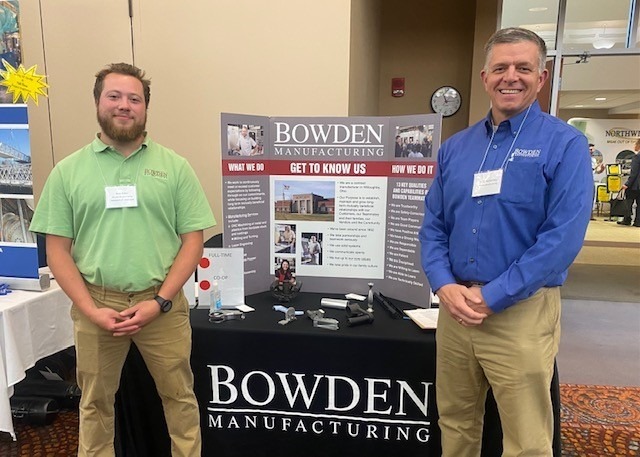
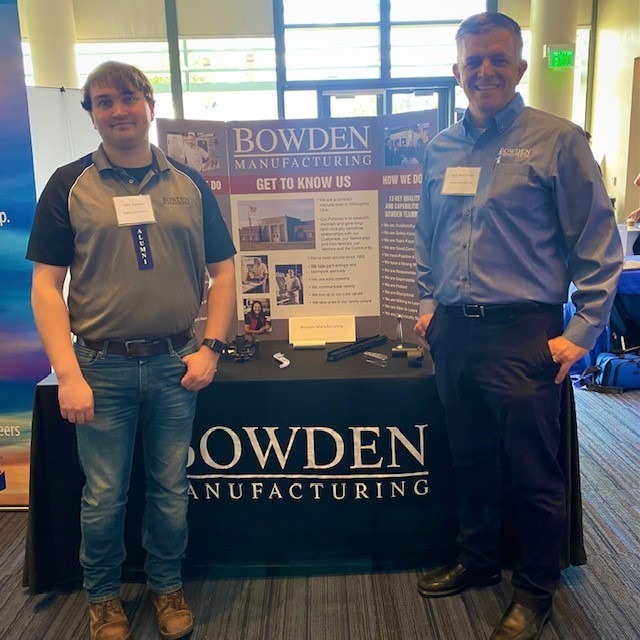
We’re looking for Mechanical Engineers to do Internships, Co-Ops, and Full-Time hires. Our program is designed to get them dirty and teach them how to make stuff in a very hands-on environment. Our group of 17+ MEs in our building tends to make ours an inviting environment for students and grads that want to dig in and learn about manufacturing process design, CNC machining, laser-marking, and assembly.
The first two career fairs that we attended were extremely busy and the in-person environment made it much easier to talk with more students more quickly and easily. As much as the technology for the virtual career fairs had improved from the beginning of the pandemic, it still was no comparison to being on campus and in-person.
For Many Students, it is Their First In-Person Career Fair
In talking with many of the students this week, we realized that for many of them, because of the pandemic, this was their first in-person career fair.
Since many students don’t attend career fairs prior to their junior year and with the pandemic limiting activities for the last two years they didn’t have much of a chance to attend one, a significant percentage of the students were attending for their first time.
Many of them were a bit nervous, beyond even their normal nervousness talking with adults! we tried to help them get over their fears by being open, smiling, and inviting so they could quickly get to a point where they could talk with us comfortably.
Breaking the ice by talking about their hometowns, hobbies or other interests helped them relax and get into the conversation.
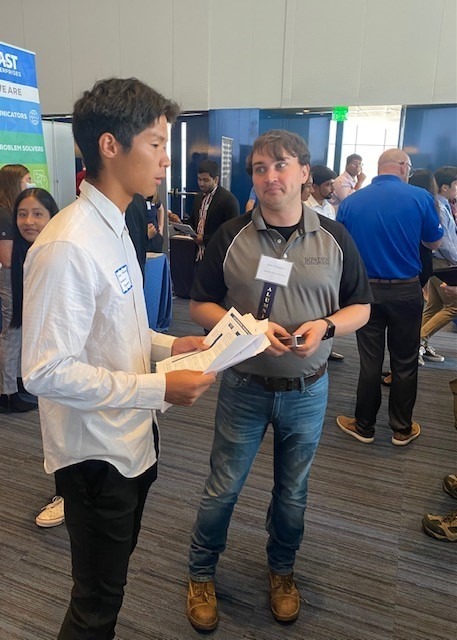
Making Career Fairs Productive
There are four things that we’ve learned that most any Employer can do for a more productive visit to a college career fair:
1. Know Your Candidate Criteria
Time is limited at Career Fairs. There are a sea of students that will approach your table regardless of whether they might be a good fit. It’s extremely important that if you have ANY limiting criteria, you establish them and make them an early part of your conversation.
For example, because of the US Department of Defense work that we do, we can only hire US Citizens. While it is tempting to want to have longer conversations with candidates that we can’t hire, there simply isn’t time.
Another criterion for us is that they need to be willing (even eager!) to get dirty as a part of their job. If that’s even questionable, we’ll push them to make sure they understand it’s part of our job description. Much better to find that out right away, rather than spending time with that person when you know you can’t hire them.
2. Get Good Candidates Setup
It’s important to have a clear intention of your intended outcomes at the career fair. The career fair often starts the recruiting process for college students and it’s important that you are getting them properly set up to enter your company’s recruiting process funnel.
If you are screening out based on certain factors (for us, it’s their academic major and confirmation of US Citizenship), make sure those criteria are clear to your Team. Knowing what information you need from the candidates, getting it, and keeping it organized to simplify the follow-up portion of the process is an important opportunity.
For us, we need their resume, email address, and phone number. We have a form that they complete at our table with other pertinent information that includes their availability and graduation date. We’ll create a contact record in our CRM system to enter these data points for future communications with them.
3. Be Clear on Next Steps
It’s likely that your recruiting/hiring process is pretty clearly established. If it’s not, that’s something worth working on. Hopefully, it is, but often it’s not communicated clearly to the students.
Letting them know what the next steps of the process might be will allow them to feel good about continuing down your path. If they aren’t sure, they might be too nervous or scared to ask.
Nobody likes moving into a fog and if the way forward with your company is not clear, they are far less likely to pursue it further.
For us, we let them know that we’ll send them an email with some dates and timeslots to come for a tour & interview at our shop. We describe the visit and let them know that it’s not just an interview, it’s an opportunity to check out a local manufacturing company to start to see what an industrial environment might be like.
4. Have a Follow Up Plan
The great part of having the career fair is that you can get a lot of contact with students in a very concentrated timeframe. They are excited for the opportunities and the chance to consider their future and you are excited to meet a bunch of young and enthusiastic new prospective Teammates. It’s important, even before going to the career fair, that you have a clear follow-up plan. It is important to determine:
- Who do you want to contact
- When you’ll reach out to them
- Establish the next steps in the process to ensure that you maximize your opportunity at the career fair
We enter their information into our system and we’ve already set up dates and timeslots for the tour/interview sessions over the next 3-6 weeks. We’ll email them all within a week of the career fair, while their attention is somewhat on their futures, and keep the process moving forward. Our experience has been that waiting too long will result in fewer students responding.
One fact to remember, there will inevitably be a percentage of the students that fall out of the funnel for lack of responding at each stage of the process. It’s similar to any recruiting or sales process where the math plays out: you need a certain number of prospective candidates at the top of the funnel to yield an output of qualified applicants at the bottom. It’s a numbers game and a career fair can be a great spot to fill up the top of your funnel.
Final Thoughts
It’s super exciting to be able to be back in person at college career fairs. The excitement and enthusiasm of the students are contagious and we’re all anxious to be getting back to “normal” again. We’ve found that college students and recent graduates are a great source of new Teammates and by working through the four things listed above, we’ve made our process of attending career fairs a much more productive experience.
If you’re interested in discussing career fair recruiting or the hiring of students in a manner similar to our Manufacturing Next Gen Program, please don’t hesitate to contact us.
